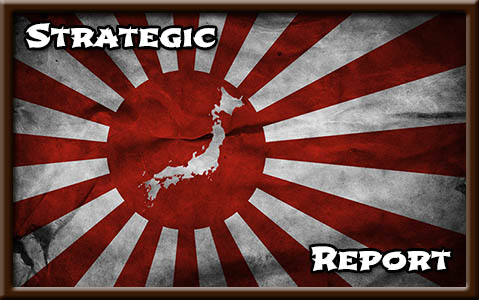|
Did you make an amphibious landing during a thunderstorm?
|
|
|
|

|
| # ? Jun 6, 2024 12:55 |
|
Grey Hunter posted:
I had to look up the CW-22, I wonder if the Royal Netherlands East Indies Army Air Force is getting any combat experience doing straifing runs at 22,000 feet with a single forward fireing machine gun.
|
|
|
|
My knowledge of the Pacific war isn't really that in-depth... were Dutch submarines as badass IRL as they tend to be in WITP?
|
|
|
|
|
A bit mixed. Some survived the war but achieved relatively little, some got scuttled because their home-bases were captured while they were in dock, some did pretty great things. One got sunk by another submarine.
|
|
|
|
Drone posted:My knowledge of the Pacific war isn't really that in-depth... were Dutch submarines as badass IRL as they tend to be in WITP? Well, their real life performance was very mediocre. I can't really tell to what extent it was due to their technical specifications, and how much Dutch training, doctrine and poor conditions for waging a war were at fault. Also the Dutch subs that survived 1941-2 generally didn't sink anything of note afterwards - I'm curious if they were grounded in Allied ports for most of the time (though I know they did go on patrols at least occasionally), or were used for training / recon operations with no intention of sinking targets. goatface posted:some did pretty great things. Did they? I can' recall / find a Dutch sub that would be considered successful by the standards of the major naval powers.
|
|
|
|
^^ Didn't K XIV sink a half dozen decent sized ships in the space of a few months, or something similar? I think a few got sent for refit in the UK.
|
|
|
|
Subs sank something like 70% of the total tonnage of ships sunk during the Pacific war. We talk a lot about big carrier engagements and why the Pacific War decisively proved that the Carrier>Battleships, but the real outcome of the war was the realization that Subs> Pretty much every other surface vessel.
|
|
|
|
goatface posted:^^ Didn't K XIV sink a half dozen decent sized ships in the space of a few months, or something similar?  Not just in a few months, in one day.
|
|
|
|
goatface posted:^^ Didn't K XIV sink a half dozen decent sized ships in the space of a few months, or something similar? Yeah, seems like she sank or damaged four ships in a single action. Then four years of nothing. Very inconsistent, possibly hinting at her class having a wasted potential?
|
|
|
|
Wasn't part of the reason for the stunning success of our subs that Japanese ASW was really really poo poo? Like as lovely as their damage control?
|
|
|
|
Night10194 posted:Wasn't part of the reason for the stunning success of our subs that Japanese ASW was really really poo poo? Like as lovely as their damage control?
|
|
|
|
AceRimmer posted:Basically that plus seriously underestimating American subs due to the Mk. 15 torpedo travesty as far as I understand it. Also ASW and convoys didn't really fit into the whole decisive battle idea? Yup. The Japanese Navy disregarded almost everything that didn't contribute directly to destroying enemy surface ships. They were as a rule mediocre to downright terrible at AAA, radar, ASW, damage control, logistics, convoy protection, and scouting. At the outset of the war the IJN was all but unbeatable in a short-term conflict, which was precisely what they intended to fight both tactically and on a grand strategic level. In a prolonged conflict, both economics and general naval doctrine doomed the Japanese against the United States Navy. Once the Americans sorted out their infamous torpedo issues, the Silent Service was arguably the most important branch of the USN in the Pacific. American admirals testified at Nuremburg in defense of Germans tried for practicing unrestricted submarine warfare on the basis that the USN did the same thing to Japan and that unrestricted submarine warfare was vital to the USN's success in the Pacific.
|
|
|
|
Night10194 posted:Wasn't part of the reason for the stunning success of our subs that Japanese ASW was really really poo poo? Like as lovely as their damage control? There was no central shipping authority that could enforce a convoy system, or even just increase shipping efficiency, and Navy officers were largely insulated from the world, living in their own microcosm, and as far as they were considered, escort missions were below their dignity, so very few ships were made available for ASW duties. The WITP player fortunately doesn't have to respect these historical realities.
|
|
|
|
steinrokkan posted:Yeah, seems like she sank or damaged four ships in a single action. Then four years of nothing. Very inconsistent, possibly hinting at her class having a wasted potential? If memory serves, they spent half the war trying not to be scrapped and having their crew reassigned to new US subs that were being offered to the Dutch navy. They weren't "good" submarines, they were just better than most of the allied things in theatre due to having working torpedoes and experienced crew.
|
|
|
|
Honestly the beginning of the submarine war in the Pacific reminds me of the beginning of the submarine warfare in WWI - in both cases the attackers achieved great victories against hapless, poorly commanded ships. In WWI the scenario described the sinking of British barrack ships by the German Navy, in the WWII it describes the sinking of invasion fleet ships by submarines employing pretty primitive tactics.
|
|
|
|
Whoo-wee. I read Tameichi Hara's memiors about the war, and he had some very revealing words. For example, Japanese destroyers were equipped with ASW systems, but only the newest (like his Amatsukaze) saw frequent upgrades. Additionally, Japanese ASW systems only functioned at around 20 knots, and even then, very poorly and only at certain angles to the ship. Additionally, the lack of hedgehogs (ie depth charge rapid deployers) meant that most Japanese destroyers manually dumped depth charges off the back end of their boats. Even further, the lack of formal training and doctrine against this kind of attack meant that most Japanese destroyers and escorts were very inexperienced at fighting subs at the outset (this changed quickly). Basically, the only reason the USN's sub arm wasn't even more deadly was that the Mark 14 didn't function correctly for around 14 months after the beginning of hostilities, with ridiculous 90% failure rate. There a case posted upthread were a sub fired something like 9 torpedos at a carrier, and none of them detonated. Ironically, the only real advantage the Japanese Navy had over the US was that their torpedos both worked and were markedly superior to the American Mark 14 (at the outset, mind). Additionally, the Japanese had developed a formal and functional torpedo doctrine that played out actually pretty well. A Festivus Miracle fucked around with this message at 03:18 on Apr 3, 2016 |
|
|
|
A White Guy posted:Ironically, the only real advantage the Japanese Navy had over the US was that their torpedos both worked and were markedly superior to the American Mark 43 (at the outset, mind). Additionally, the Japanese had developed a formal and functional torpedo doctrine that played out actually pretty well. However, the IJN and USN used torpedoes very differently. The Japanese considered the torpedo the primary weapon of the destroyer and even equipped cruisers with them, and excelled at using them during night attacks - the Long Lance was a very powerful weapon and the Japanese knew how to use it. The USN used destroyers primarily in an escort role and did not use them for torpedo attacks against surface targets regularly, instead using torpedoes primarily with submarines.
|
|
|
|
True, the Americans used their destroyers in a much less combat ready capacity. But also consider that the Americans positively crapped out destroyers left and right, so losing a whole squadron in one gulp (which happened multiple times) was no big deal. The Japanenese built 63 destroyers during the war. The Americans built ten times that many.
|
|
|
|
A White Guy posted:True, the Americans used their destroyers in a much less combat ready capacity. But also consider that the Americans positively crapped out destroyers left and right, so losing a whole squadron in one gulp (which happened multiple times) was no big deal. The Japanenese built 63 destroyers during the war. The Americans built ten times that many. Quite true, but the Americans and Japanese had radically different doctrines for employing their destroyers as well. The Japanese, per their strategic predilections, designed the destroyer primarily as an offensive weapon against surface ships with other roles such as ASW considered secondary priorities at best. The Americans had a more strategically defensive doctrine for their destroyers, using them primarily as escorts and screening elements rather than offensive units in their own right. This accordingly lead to significant differences in equipment and weaponry between Japanese and American destroyers. When considering Japanese combat ships of any type during WW2, it is a safe assumption that the ship in question was designed as an offensive weapon against surface targets and other roles were at best secondary considerations.
|
|
|
|
This all really kind of long-winded way to say that the Japanese goals at the start of the war were unrealistic. To force Britian and the US to the peace table, they would have had to 1. Annihilate the US Battleship fleet and its carrier contingent 2. Capture Burma and large tracts of India 3. Occupy major parts of Australia (a country 2/3rds the size of the US) 4. Simultaneously occupy the entire DEI and much of the South Pacific 5. Annihilate the entire British Pacific and Indian Ocean fleets 6. Do all this while simultaneously fighting in the 2nd largest country on Earth 7. Do so in the entire span of 1942. You can probably expand on this, but basically, the Japanese were hoping for total, entirely unimpeded victory at literally every single step of the process to even have a chance at bringing US and Britain to the peace table. Sure, hindsight is 20/20, but even looking from their perspective, the idea is absolutely absurd.
|
|
|
|
Right wing militarists are pretty notoriously bad at weighing the odds of military conflicts.
|
|
|
|
Japan was trying to repeat what they did to Russia in 1905: sink two enemy fleets in two big battles and have the other side agree to a peace treaty just to get the war over. The Russo-Japanese war isn't much remembered today, but at the time it had tremendous impact.
|
|
|
|
Did they remember to have their enemy be in a long period of Imperial decline and also fighting off revolutionary movements that showed it had lost the loyalty of portions of the military because that was a big contributing factor there. But yes, the Russo-Japanese war was huge and also what put Japan on the map of Imperial Powers.
|
|
|
|
A White Guy posted:This all really kind of long-winded way to say that the Japanese goals at the start of the war were unrealistic. To force Britian and the US to the peace table, they would have had to It's honestly not any sillier than Hitler's plan to invade the UK without naval supremacy or even any real troop transport/supply transport capacity while invading the USSR.
|
|
|
YodaTFK posted:It's honestly not any sillier than Hitler's plan to invade the UK without naval supremacy or even any real troop transport/supply transport capacity while invading the USSR. The evidence suggests that SEALION was never intended to go forward, and was principally a smokescreen for BARBAROSSA. According to most of the histories I've read, BARBAROSSA was intended as much to take out the UK as it was to eliminate the USSR - Hitler believed that the only thing keeping the British in the fight was the hope of rescue from the Soviets or the Americans. He dealt with the latter by issuing strict orders not to provoke hostilities even in the face of blatant acts of war (IIRC, at least one sub captain was severely disciplined for shooting at a US destroyer that was not only escorting British merchantmen but opened fire upon detection) and the former was to be crushed by swift surprise attack. Thanks to Mussolini's imbecilic Greek adventure (which delayed the assault by a critical month) and seriously bad micromanaging of the invasion by Hitler, BARBAROSSA failed to take Moscow, which very well might have caused the various "Soviet Socialist Republics" to pull a Finland and try to break free, collapsing the country into civil war. Of course, the fact that the Soviets had vastly superior weapons (once they managed to get the KV and T-34 forces supplied with ammo and spare parts) was a serious handicap.
|
|
|
|
|
There has also been considerable speculation that if Japan had restricted itself to attacking only the British and Dutch colonies, and not attacked American possessions, American entry into the Pacific war would have been delayed or maybe averted. American politics at the time were fully concerned with Europe, and were at best ambivalent about Japanese aggression against China and the European colonies in the Pacific. Yamamoto was probably right that war with the US was inevitable and modern sci-fi satire writers would be hard-pressed to come up with a more dysfunctional military and political leadership than the Japanese Empire's, but it's interesting to speculate how things could have unfolded had the Japanese bought themselves another year or two before facing the American industrial leviathan.
|
|
|
|
Cythereal posted:There has also been considerable speculation that if Japan had restricted itself to attacking only the British and Dutch colonies, and not attacked American possessions, American entry into the Pacific war would have been delayed or maybe averted. American politics at the time were fully concerned with Europe, and were at best ambivalent about Japanese aggression against China and the European colonies in the Pacific. Yamamoto was probably right that war with the US was inevitable and modern sci-fi satire writers would be hard-pressed to come up with a more dysfunctional military and political leadership than the Japanese Empire's, but it's interesting to speculate how things could have unfolded had the Japanese bought themselves another year or two before facing the American industrial leviathan. Japan HAD to attack America because of the Philippines. American plans in process at the time were to turn Luzon into a fortress, with many hundreds of planes, which was an unacceptable threat to any Japanese plans for the area. Let's say Japan only attacks the British and Dutch colonies and somehow the US doesn't enter the war (we probably still would). Now you've taken all those resources you want, but now it's mid 1942 and you have Luzon, an unsinkable aircraft carrier with 800 American planes, sitting right in the middle of your shipping lanes. You have the resources but the Americans can block your access to them at will, and by now the Philippines are a far tougher nut to crack than if you'd just gone ahead and taken them 6-8 months earlier while all those planes were coming out of factory lines in the US. Getting the US out of the Philippines was a major strategic priority for the Japanese and the "only attacking British and Dutch" idea was never a reasonable way to accomplish their war goals, and they knew it.
|
|
|
|
gohuskies posted:Japan HAD to attack America because of the Philippines. American plans in process at the time were to turn Luzon into a fortress, with many hundreds of planes, which was an unacceptable threat to any Japanese plans for the area. Let's say Japan only attacks the British and Dutch colonies and somehow the US doesn't enter the war (we probably still would). Now you've taken all those resources you want, but now it's mid 1942 and you have Luzon, an unsinkable aircraft carrier with 800 American planes, sitting right in the middle of your shipping lanes. You have the resources but the Americans can block your access to them at will, and by now the Philippines are a far tougher nut to crack than if you'd just gone ahead and taken them 6-8 months earlier while all those planes were coming out of factory lines in the US. This is an extremely cogent analysis. Even with the limited number of planes available on Dec 7 1941, the Philippines were an incredibly powerful salient against the Japanese. Those planes were squandered, however, just as the USN submarines in the area were mostly tasked to useless support missions.
|
|
|
|
Well, I am finally caught up to this thread. How far do you actually hope to expand your mighty Japanese Empire Grey? Also, as for ship picking: I will take the SS Porpoise, assuming it remains unpicked (I checked and it doesn't seem to be) simply for the sheer pun value of the name.
|
|
|
|
|
   I despair of my destroyer captains.  The Dutch air force continues to be ineffective.  Batavia should fall soon – they lost half their AV yesterday, and took similar losses today.  Samerang falls quickly.   I smash another Chinese force, forcing them to retreat north – step by step we consolidate our hold on the south.  We finally crush that Corps near Foochow.   A good day in China, and the Java invasion is going well. Time to start marching troops around before forming up to it Soreabaja. We are now a while 14 points from overtaking the Allies score.  What the.... There were no reports of a sub attack! Or any other attacks this turn!
|
|
|
|
A White Guy posted:This all really kind of long-winded way to say that the Japanese goals at the start of the war were unrealistic. To force Britian and the US to the peace table, they would have had to Or, and here's the other option, they grab what they can and then entrench like hell, making the British and the Americans pay for every inch, gambling that they (the Japanese) would care more about Asian colonies than the Allies would. It's not terribly unreasonable: the British were forced to abandoned their colonies not long after the war because holding them just wasn't sustainable. And besides, they were currently getting the poo poo bombed out of them by the Germans, and Europe 1941 is looking very pro-Axis. The US was quite close to quitting the Philippines anyway, the people had generally been signally a big shift towards isolationism and an unwillingness to confront the outside. I think it's easy to look at WWII in hindsight and say well, clearly this was going to be an annihilatory war where Japan had no hope of winning, and I think the IJN knew that was the case. That's why they went all in on the decisive battle; they were never going to win the long war. I think just looking at production numbers and manpower can be a powerful way to assess outcomes but I can totally imagine a war in South East Asia that the US is brought in to to defend the colonies of a fading European ally where, despite truly overwhelming tactical, strategic, technological and industrial advantages America isn't willing to spend the blood required to win the war.
|
|
|
|
steinrokkan posted:Depends on how you mean it. Points wise, Chinese squads are worth half the points value of the Japanese. Chinese replacement rate is actually 400/month these days, the limiting factor is always gonna be supply.
|
|
|
|
the JJ posted:The US was quite close to quitting the Philippines anyway I'm looking around for my cite, but this is not true at all at the military level. While much of the US civilian population was becoming increasingly isolationist, US military leaders were acutely aware of Japan's expansionist plans and during the second half of 1941 they were beginning to aggressively fortify the Philippines in response. As long as the US had an interest in limiting Japanese expansion (which US leaders believed they did) the Philippines were an essential asset for the US and they intended to use them.
|
|
|
|
gohuskies posted:I'm looking around for my cite, but this is not true at all at the military level. While much of the US civilian population was becoming increasingly isolationist, US military leaders were acutely aware of Japan's expansionist plans and during the second half of 1941 they were beginning to aggressively fortify the Philippines in response. As long as the US had an interest in limiting Japanese expansion (which US leaders believed they did) the Philippines were an essential asset for the US and they intended to use them. I should clarify, quitting as in granting independence but keeping options open for bases. https://en.wikipedia.org/wiki/Tydings%E2%80%93McDuffie_Act
|
|
|
|
Saros posted:Chinese replacement rate is actually 400/month these days, the limiting factor is always gonna be supply. Well, while that is more than double the figure I half-remembered reading somewhere, it's still very, very little.
|
|
|
|
the JJ posted:I should clarify, quitting as in granting independence but keeping options open for bases. Yeah, Clark Field might well have become a nearly impregnable bastion if we'd had another 18 months to finish building it and stockpiling supplies.
|
|
|
|
A White Guy posted:Whoo-wee. I read Tameichi Hara's memiors about the war, and he had some very revealing words. For example, Japanese destroyers were equipped with ASW systems, but only the newest (like his Amatsukaze) saw frequent upgrades.  Destroyer Matsukaze. Same ship? What a coincidence! e. Oh, looks like not: https://en.wikipedia.org/wiki/Japanese_destroyer_Matsukaze_%281923%29 vs. https://en.wikipedia.org/wiki/Japanese_destroyer_Amatsukaze_%281939%29 Leperflesh fucked around with this message at 19:51 on Apr 3, 2016 |
|
|
|
the JJ posted:Or, and here's the other option, they grab what they can and then entrench like hell, making the British and the Americans pay for every inch, gambling that they (the Japanese) would care more about Asian colonies than the Allies would. It's not terribly unreasonable: the British were forced to abandoned their colonies not long after the war because holding them just wasn't sustainable. And besides, they were currently getting the poo poo bombed out of them by the Germans, and Europe 1941 is looking very pro-Axis. That's what Japan did historically. They entrenched and made every island battle a bloody gambit once leadership realized that the war had been lost (which they did about mid-1943). The objective was to make every inch gained so bloody as to deter the American/British publics from supporting the war, in the hopes of forcing an honorable ceasefire. Much like the initial decision to attack Hawaii, the Japanese leadership fundamentally misunderstood just how jingoistic and profoundly patriotic Americans are. By launching a surprise attack on Hawaii, the Americans were out for as much blood as they could squeeze, especially as the momentum of the Pacific campaign turned in their favor. quote:The US was quite close to quitting the Philippines anyway, the people had generally been signally a big shift towards isolationism and an unwillingness to confront the outside. I think it's easy to look at WWII in hindsight and say well, clearly this was going to be an annihilatory war where Japan had no hope of winning, and I think the IJN knew that was the case. That's why they went all in on the decisive battle; they were never going to win the long war. Yes, the Japanese were going for the all-in. Unfortunately, what it would've taken to achieve that total victory was well beyond the reach of the Japanese in 1941, because literally everything had to happen perfectly. Their gameplan was nothing less than "win literally every single time anything happens". quote:I think just looking at production numbers and manpower can be a powerful way to assess outcomes but I can totally imagine a war in South East Asia that the US is brought in to to defend the colonies of a fading European ally where, despite truly overwhelming tactical, strategic, technological and industrial advantages America isn't willing to spend the blood required to win the war. The differences between WW2 and the Vietnam war are profound. Even though the Americans, in almost every sense, were better at the military aspect of warfare in Vietnam, Vietnam was not a 'military' war. WW2 was a war about taking objectives, destroying the standing armies of the enemy, and killing as many people as it took to do it. By Vietnam, that logic was no longer acceptable, especially since the Americans could not logically hope to conclude the war in Hanoi (because doing so would've inevitably brought the intervention of the Chinese, like it did during the Korean War). Factor in years of highly visible casualties, a public that was shown the 'true' reality of warfare as horrible and gruesome, an economy that was slowly sliding into the stagflation era of the '70s, and finally, the impact of the draft, and you find that the direct parallels you can draw between WW2 and Vietnam aren't nearly as clear. Secondly, people forget that WW2, for America at least, was short and relatively less bloody. Unlike the Soviet Union, which suffered a ridiculous 25-30 million deaths, America suffered a grand total of roughly 1.3 million casualties, with only 400k war dead. Additionally, the true impact of WW2 wasn't really felt on the homefront beyond rationing, and the wartime measures that the government felt was necessary. America additionally only fought for a grand total of 3.8 years, for a war that mainly decided on the raw manufacturing ability of the participants. America wasn't bombed (okay, aside from some really minor shellings), it wasn't embargoed, and people didn't starve to death in the streets during the war, as happened in the Soviet Union. Additionally, the justification in the mind of the American public was obvious - 'them drat Axis bastards dun sneak attacked us! We's gonna kill every one of them motherfuckers!' Compare with the Vietnam war. Huge numbers of young men get drafted to fight in a country that most had never even heard of prior to 1963. The justification? 'Um...stopping communism', a thing which most people had never actually experienced and therefore, had no real motivation against. The war drags on for ten long years. America suffers 1/4th of the combat casualties they did in WW2, in a highly public way that affects the lives of virtually every American. There are highly visible protests. Cops visibly beating the poo poo out of protestors, blah blah blah. You get the picture.
|
|
|
|
why do they name the small fragile ships "destroyers". they're so small, what do they destroy?
|
|
|
|

|
| # ? Jun 6, 2024 12:55 |
|
Mans posted:why do they name the small fragile ships "destroyers". they're so small, what do they destroy? Torpedo boats
|
|
|




































